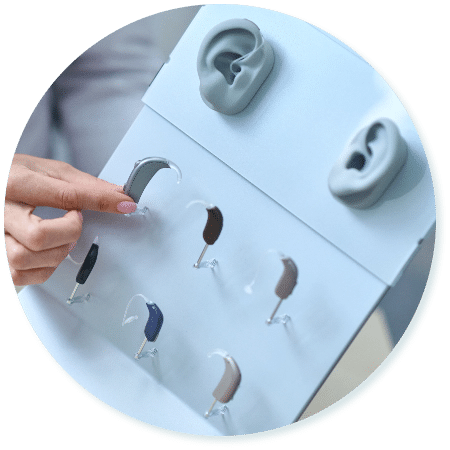What is
Hearing Loss?
If you have a difficult time following the conversation, you’re not alone. Approximately 48 million people in the U.S. have some degree of hearing loss. Those with hearing loss can hear sounds, they just lack clarity. There are varying degrees of hearing loss: mild, moderate, moderately severe, severe or profound. If you suspect you have a hearing impairment, or you are over the age of 60, you should have your hearing checked.

Signs of Hearing Loss
The most common type of hearing loss is sensorineural, which often occurs gradually as we age. For this reason, it can be difficult to recognize the signs. If you have noticed any of the following, then you should contact us for an appointment.
- It seems like people mumble or speak too softly
- You feel tired after conversations
- You frequently ask people to repeat themselves
- You miss words in a conversation
- You need to turn the TV volume up to hear
- It’s harder to hear when there is background noise
- You can’t hear the person on the other end of the phone


Types of Hearing Loss
Just as there are varying degrees of hearing loss, there are also different types.
Sensorineural hearing loss is the most common type of loss, experienced by the most people. This type of loss occurs when the hearing nerve cannot transmit sound from the inner ear to the brain. This can be caused by age, genetics, ototoxic medications, prolonged exposure to loud noise, or due to a health condition such as diabetes, heart disease, or high blood pressure.
Conductive hearing loss is less common and occurs due to an issue with sound be conducting through the outer/middle ear to the inner ear. Causes include clogged ears due to impacted earwax, ear infection, fluid in the middle ear, or head/ear trauma. This type of hearing loss will need to be treated by a physician or ENT.
Mixed hearing loss is a combination of sensorineural and conductive. To treat this type of loss, first the conductive portion would need to be treated and then the sensorineural portion can be managed with hearing aids.

Hearing Loss and Brain Health
Our hearing plays an integral role in having a healthy and active brain. The brain relies on hearing to make sense of sounds. When you can’t hear well due to hearing loss, then your brain doesn’t receive the proper sound signals it needs to be active. This can result in listening fatigue, trouble remembering information, and even cognitive decline.
It’s important to manage hearing loss at the first signs. Hearing aids are a great option as they will provide your brain with the necessary sounds it needs to hear and process information. Hearing aids can keep your brain healthy, help you feel younger, and be more connected to your loved ones. If you are concerned about how hearing instruments look, we carry discreet hearing aids. It’s better to wear a device that can help you hear rather than be disconnected from your world.

Tinnitus
Tinnitus is described as hearing a ringing, buzzing, humming, or other sound in the ears when no external sounds are present. Everyone experiences tinnitus differently. There are several types of tinnitus.
- Limited tinnitus – This is the most common type of tinnitus and is a short-term experience lasting from minutes to days.
- Objective tinnitus – This type of tinnitus can be perceived by others and will need to be assessed by a medical professional.
- Subjective tinnitus – This occurs when only you can hear your tinnitus.
- Somatic tinnitus – This form is typically related to physical movement or touch. Some people have found neck pain to trigger their tinnitus while others say muscle spasms trigger it.
There are many causes of tinnitus, including hearing loss, head trauma, loud noise exposure, or medication. No matter the cause, if your ears are ringing suddenly, you should visit us for a hearing evaluation. A hearing evaluation is the first step in determining how tinnitus is affecting you and if hearing aids could help you experience relief.


